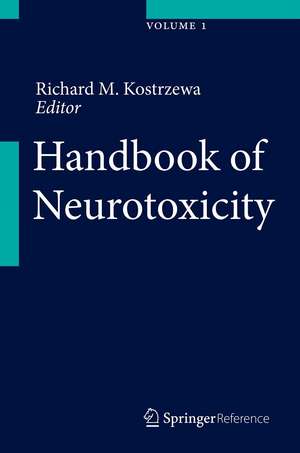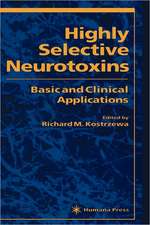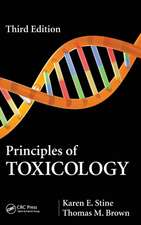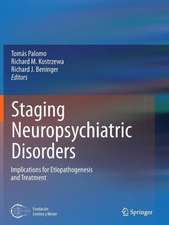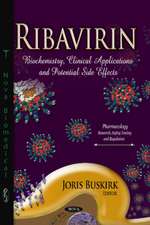Handbook of Neurotoxicity
Editat de Richard M. Kostrzewaen Limba Engleză Hardback – 3 iun 2014
| Toate formatele și edițiile | Preț | Express |
|---|---|---|
| Hardback (2) | 3147.76 lei 3-5 săpt. | |
| Springer – 3 iun 2014 | 3147.76 lei 3-5 săpt. | |
| Springer International Publishing – 3 ian 2023 | 7276.82 lei 3-5 săpt. |
Preț: 3147.76 lei
Preț vechi: 3838.74 lei
-18% Nou
Puncte Express: 4722
Preț estimativ în valută:
602.39€ • 628.11$ • 500.65£
602.39€ • 628.11$ • 500.65£
Carte disponibilă
Livrare economică 27 februarie-13 martie
Preluare comenzi: 021 569.72.76
Specificații
ISBN-13: 9781461458357
ISBN-10: 1461458358
Pagini: 2488
Ilustrații: XXXVIII, 2371 p. 244 illus., 147 illus. in color. In 3 volumes, not available separately.
Dimensiuni: 155 x 235 x 137 mm
Greutate: 5.99 kg
Ediția:2014
Editura: Springer
Colecția Springer
Locul publicării:New York, NY, United States
ISBN-10: 1461458358
Pagini: 2488
Ilustrații: XXXVIII, 2371 p. 244 illus., 147 illus. in color. In 3 volumes, not available separately.
Dimensiuni: 155 x 235 x 137 mm
Greutate: 5.99 kg
Ediția:2014
Editura: Springer
Colecția Springer
Locul publicării:New York, NY, United States
Public țintă
ResearchCuprins
Neurotoxins: Survey of Selective Neurotoxins.- Necroptosis, a potential therapeutic target for neurological disorders.- Cell System for Identifying Dopaminergic Neurotoxicity.- Microglia: Neuroprotective and Neurodestructive Properties.- 6-Hydroxydopamine Lesioning of Dopamine Neurons in Neonatal and Adult Rats Induces Age-Dependent Consequences.- Dopamine and L-DOPA as Selective Endogenous Neurotoxins.- Nature of DSP-4-Induced Neurotoxicity.- MPTP Neurotoxicity: Actions, Mechanisms and Animal Modeling of Parkinson’s disease.- Cocaine as a Neurotoxin.-
76-5,6- and 5,7-Dihydroxytryptamines as Serotoninergic Neurotoxins.- 2´-NH2-MPTP: A Serotonin and Norepinephrine Neurotoxin.- Methamphetamine and MDMA neurotoxicity: Biochemical and molecular mechanisms.- Glutamate as a Neurotoxin.- Domoic acid as a Neurotoxin.- Endogenous Kynurenic acid and Neurotoxicity.- Neurotoxicity in psychostimulant and opiate addiction.- Molecular Mechanism and Effects of Clostridial Neurotoxins.- Botulinum neurotoxins as therapeutics.-Neurotoxic Effects, Mechanisms and Outcome of 192-IgG Saporin.- TRPV1 activators ("vanilloids") as neurotoxins.- Part 2: Dopamine Chemistry & Parkinson Disease.- 6-Hydroxydopamine as preclinical model of Parkinson's disease.- Advances in stem cell research for Parkinson disease.-Alpha synuclein in Parkinson's Disease.- Autophagic pathways and Parkinson disease.- Dopaminergic neurons in Parkinson's disease.- Iron Neurotoxicity in Parkinson´s Disease.- Links between paraquat and Parkinson's disease.- Manganese neurotoxicity.- Mechanisms of dopamine oxidation and Parkinson´s Disease.- Neuroinflammation and Parkinson´s Disease.- Neuromelanin and Parkinson's disease.- Neurotoxicity of 1-methyl1-4-phenyl-1,2,3,6-tetrahydropyridine (MPTP) as a Parkinson´s disease model.- N-Methyl-(R) Salsolinol and the enzymes catalyzingits synthesis and metabolism in Parkinson´s Disease.- Regulation of DA homeostasis and role of VMAT2 in DA-induced neurodegeneration.- Rotenone as preclinical model compound in Parkinson disease.- Part 3: Glutamate Receptor Agonists & Antagonists.- Concept of Excitotoxicity via Glutamate Receptors.- Role of Ionotropic Glutamate Receptors in Neurodegenerative and Other Disorders.- Ionotropic Receptors in the Central Nervous System and Neurodegenerative Disease.- Glutamate Neurotoxicity, Transport and Alternate Splicing of Transporters.- AIDS.- Cancer-mediated neurotoxicity.- Drug Treatments for Alzheimer´s Disease: Hopes and Challenges.- Epilepsy.- Excitotoxicity and Amyotrophic Lateral Sclerosis.- Excitotoxicity and axon degeneration.- Excitotoxicity in HIV associated neurocognitive disorders.- Excitotoxicity in the Pathogenesis of Autism.- Glutamate and Neurodegeneration in the Retina.- Glutamate in the Pathogenesis of Gliomas.- Glutamate Neurotoxicity related to Energy Failure.- Glutamategric receptors in Parkinson`s disease.- Lead & excitotoxicity.- MS & excitotoxicity.- Neuroprotectants Targeting NMDA Receptor Signaling.- Neuroprotection by Kynurenine Metabolites.- Neuroprotective Strategies in Amyotrophic Lateral Sclerosis: Modulation of Neurotransmittory and Neurotrophic Input to Motor Neurons.- Neurotoxicity and ALS: Insights into Pathogenesis.- Neurotoxicity and Neuroprotection in Spinal Cord.- Neurotoxicity and Stroke.- Neurotoxicity in Huntington Disease.- Neurotoxicity: a complex multistage process involving different mechanisms.- Quinolinate and related excitotoxins: mechanisms of neurotoxicity and disease relevance.- Role of Neurotoxicity in Depression.- Part 4: Neurotrophins: Amyloid-Beta, BDNF and the Mechanism of Neurodegeneration in Alzheimer´s Disease.- BDNF V66M polymorphism and brain functions.- Blood brain-derived neurotrophic factor levels and mood disorders.- Neuroprotection in Demyelinating Diseases: the therapeutic potential of the neurotrophins.- Neurotrophic Factors and Ethanol Neurotoxicity.- Neurotrophic factors and NeuroAIDS: a lesson from brain-derived neurotrophic factor.- Neurotrophic therapy for ALS/ MND.- Neurotrophins and p75NTR in axonal regeneration and myelination.- Neurotrophins and pain.- Neutrophin signaling in Cancer.- NGF and immune regulation.- NGF/P75 in cell cycle and tetraploidy.- p75NTR processing and signaling: functional role.- p75NTR-A molecule with multiple functions in amyloid-beta metabolism and neurotoxicity.- Seizures tip the balance of neurotrophin signaling towards neuronal death.- Synthesis, trafficking and release of bdnf.- Trafficking of neurotrophins and their receptors and pathological significance.- Part 5: Diseases and Disorders Relevant to Neurotoxins.- Drug Abuse Neurotoxicity: Alcohol and Nicotine as Developmental Stressors.- Experimental Approach to Alzheimer Disease.- Fusion Models and ´Fusioning`in Parkinsonism: Protection and Restoration by Exercise.- Iron-induced dopaminergic cell death in vivo as a model of Parkinson´s disease.- Molecular, cellular and behavioural effects produced by perinatal asphyxia: protection by poly (ADP-ribose) polymerase 1 (PARP-1) inhibition.- MPTP: advances from an evergreen neurotoxin.- Nanomedicines for Nervous System Diseases.- Neurodegenerative aspects of multiple system atrophy.- Neurotoxic Vulnerability Underlying Schizophrenia Spectrum Disorders.- Neurotoxicity of Methamphetamine.- Pathophysiology of obsessive-compulsive disorder: Insights from normal function and neurotoxic effects of drugs, infection and brain injury.- Physical Exercise as Intervention in Parkinsonism.- Protective agents in Parkinson´s disease: caffeine and adenosine A2A receptor antagonists.- Stem Cell Therapies for Age Associated Neurodegeneration.- Tardive Dyskinesia: Outcome of antipsychotic treatment and brain damage?.- Pathogenesis of Alzheimer’s disease.- Potential therapeutic effects of statins in Alzheimer's disease.
76-5,6- and 5,7-Dihydroxytryptamines as Serotoninergic Neurotoxins.- 2´-NH2-MPTP: A Serotonin and Norepinephrine Neurotoxin.- Methamphetamine and MDMA neurotoxicity: Biochemical and molecular mechanisms.- Glutamate as a Neurotoxin.- Domoic acid as a Neurotoxin.- Endogenous Kynurenic acid and Neurotoxicity.- Neurotoxicity in psychostimulant and opiate addiction.- Molecular Mechanism and Effects of Clostridial Neurotoxins.- Botulinum neurotoxins as therapeutics.-Neurotoxic Effects, Mechanisms and Outcome of 192-IgG Saporin.- TRPV1 activators ("vanilloids") as neurotoxins.- Part 2: Dopamine Chemistry & Parkinson Disease.- 6-Hydroxydopamine as preclinical model of Parkinson's disease.- Advances in stem cell research for Parkinson disease.-Alpha synuclein in Parkinson's Disease.- Autophagic pathways and Parkinson disease.- Dopaminergic neurons in Parkinson's disease.- Iron Neurotoxicity in Parkinson´s Disease.- Links between paraquat and Parkinson's disease.- Manganese neurotoxicity.- Mechanisms of dopamine oxidation and Parkinson´s Disease.- Neuroinflammation and Parkinson´s Disease.- Neuromelanin and Parkinson's disease.- Neurotoxicity of 1-methyl1-4-phenyl-1,2,3,6-tetrahydropyridine (MPTP) as a Parkinson´s disease model.- N-Methyl-(R) Salsolinol and the enzymes catalyzingits synthesis and metabolism in Parkinson´s Disease.- Regulation of DA homeostasis and role of VMAT2 in DA-induced neurodegeneration.- Rotenone as preclinical model compound in Parkinson disease.- Part 3: Glutamate Receptor Agonists & Antagonists.- Concept of Excitotoxicity via Glutamate Receptors.- Role of Ionotropic Glutamate Receptors in Neurodegenerative and Other Disorders.- Ionotropic Receptors in the Central Nervous System and Neurodegenerative Disease.- Glutamate Neurotoxicity, Transport and Alternate Splicing of Transporters.- AIDS.- Cancer-mediated neurotoxicity.- Drug Treatments for Alzheimer´s Disease: Hopes and Challenges.- Epilepsy.- Excitotoxicity and Amyotrophic Lateral Sclerosis.- Excitotoxicity and axon degeneration.- Excitotoxicity in HIV associated neurocognitive disorders.- Excitotoxicity in the Pathogenesis of Autism.- Glutamate and Neurodegeneration in the Retina.- Glutamate in the Pathogenesis of Gliomas.- Glutamate Neurotoxicity related to Energy Failure.- Glutamategric receptors in Parkinson`s disease.- Lead & excitotoxicity.- MS & excitotoxicity.- Neuroprotectants Targeting NMDA Receptor Signaling.- Neuroprotection by Kynurenine Metabolites.- Neuroprotective Strategies in Amyotrophic Lateral Sclerosis: Modulation of Neurotransmittory and Neurotrophic Input to Motor Neurons.- Neurotoxicity and ALS: Insights into Pathogenesis.- Neurotoxicity and Neuroprotection in Spinal Cord.- Neurotoxicity and Stroke.- Neurotoxicity in Huntington Disease.- Neurotoxicity: a complex multistage process involving different mechanisms.- Quinolinate and related excitotoxins: mechanisms of neurotoxicity and disease relevance.- Role of Neurotoxicity in Depression.- Part 4: Neurotrophins: Amyloid-Beta, BDNF and the Mechanism of Neurodegeneration in Alzheimer´s Disease.- BDNF V66M polymorphism and brain functions.- Blood brain-derived neurotrophic factor levels and mood disorders.- Neuroprotection in Demyelinating Diseases: the therapeutic potential of the neurotrophins.- Neurotrophic Factors and Ethanol Neurotoxicity.- Neurotrophic factors and NeuroAIDS: a lesson from brain-derived neurotrophic factor.- Neurotrophic therapy for ALS/ MND.- Neurotrophins and p75NTR in axonal regeneration and myelination.- Neurotrophins and pain.- Neutrophin signaling in Cancer.- NGF and immune regulation.- NGF/P75 in cell cycle and tetraploidy.- p75NTR processing and signaling: functional role.- p75NTR-A molecule with multiple functions in amyloid-beta metabolism and neurotoxicity.- Seizures tip the balance of neurotrophin signaling towards neuronal death.- Synthesis, trafficking and release of bdnf.- Trafficking of neurotrophins and their receptors and pathological significance.- Part 5: Diseases and Disorders Relevant to Neurotoxins.- Drug Abuse Neurotoxicity: Alcohol and Nicotine as Developmental Stressors.- Experimental Approach to Alzheimer Disease.- Fusion Models and ´Fusioning`in Parkinsonism: Protection and Restoration by Exercise.- Iron-induced dopaminergic cell death in vivo as a model of Parkinson´s disease.- Molecular, cellular and behavioural effects produced by perinatal asphyxia: protection by poly (ADP-ribose) polymerase 1 (PARP-1) inhibition.- MPTP: advances from an evergreen neurotoxin.- Nanomedicines for Nervous System Diseases.- Neurodegenerative aspects of multiple system atrophy.- Neurotoxic Vulnerability Underlying Schizophrenia Spectrum Disorders.- Neurotoxicity of Methamphetamine.- Pathophysiology of obsessive-compulsive disorder: Insights from normal function and neurotoxic effects of drugs, infection and brain injury.- Physical Exercise as Intervention in Parkinsonism.- Protective agents in Parkinson´s disease: caffeine and adenosine A2A receptor antagonists.- Stem Cell Therapies for Age Associated Neurodegeneration.- Tardive Dyskinesia: Outcome of antipsychotic treatment and brain damage?.- Pathogenesis of Alzheimer’s disease.- Potential therapeutic effects of statins in Alzheimer's disease.
Notă biografică
Dr. Kostrzewa is professor of Pharmacology. He received his BS (1967) in Chemistry and MS (1967) in Pharmacology from Philadelphia College of Pharmacy and Science. He received his Ph.D. (1971) in Pharmacology from the University of Pennsylvania and was awarded Doctor Honoris Causa, 2005 from the Medical University of Silesia in Katowice Poland. Following his post-doctoral training in New Orleans he was appointed to the faculty at Louisiana State University. He joined the faculty in the department of Pharmacology at ETSU in 1978, rising to the rank of Professor in 1984. Dr. Kostrzewa is a world recognized authority in the neuropharmacological aspects of Parkinson Disease and ADHD, with a primary focus on Serotoninergic, histaminergic and dopaminergic systems.
Caracteristici
Major reference work
Contains detailed information on a wide number of topics
Features contributions from experts across the field
Includes supplementary material: sn.pub/extras
Contains detailed information on a wide number of topics
Features contributions from experts across the field
Includes supplementary material: sn.pub/extras
